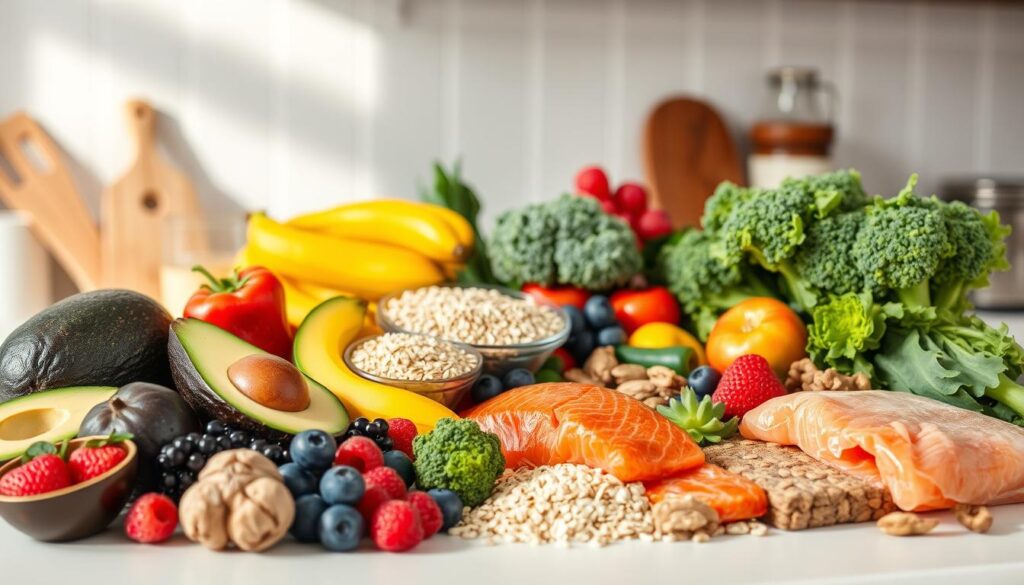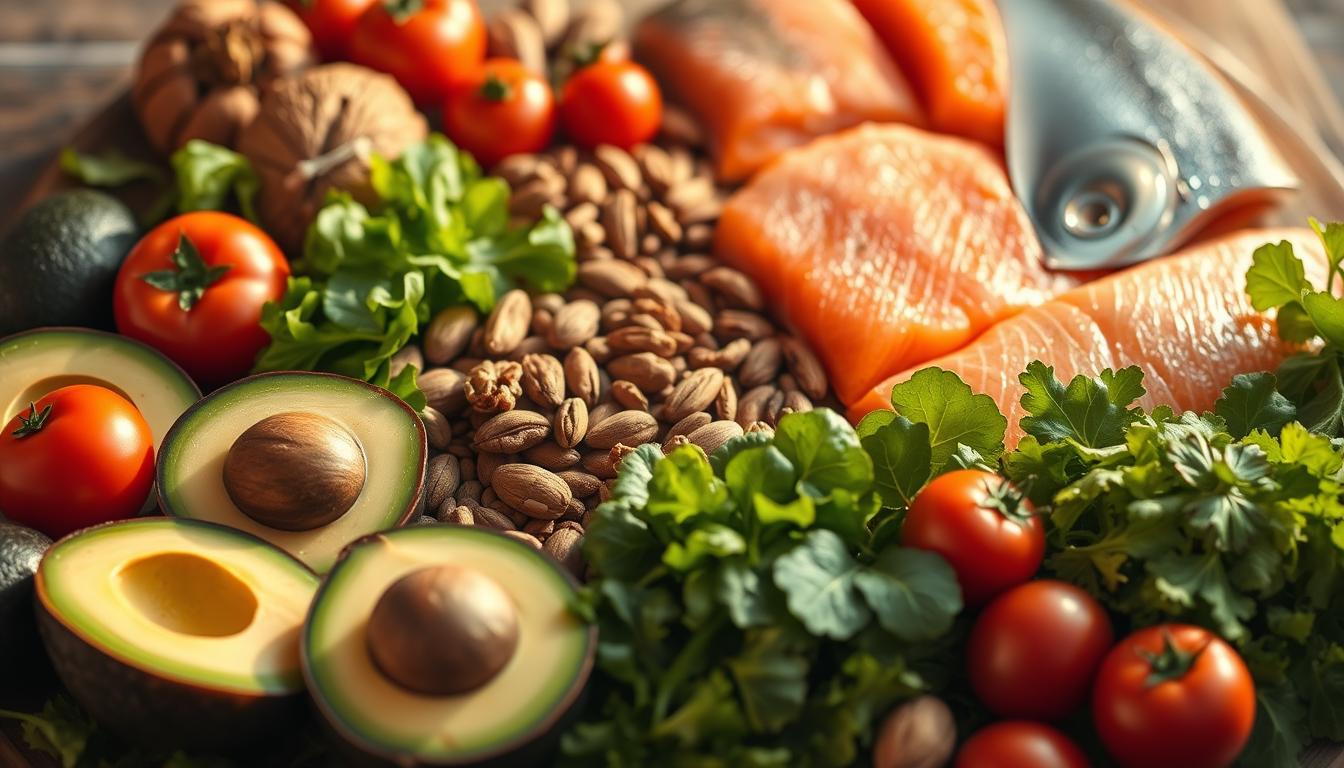High cholesterol affects nearly 1 in 3 American adults, increasing the risk of heart disease. A cholesterol-lowering diet can play a significant role in managing this condition.
Incorporating the right foods into your diet can help lower cholesterol levels and improve overall heart health. This article will explore the best foods to reduce cholesterol fast and provide insights into creating a heart-healthy diet.
Key Takeaways
- Eating a diet rich in soluble fiber can help lower cholesterol.
- Including foods high in omega-3 fatty acids supports heart health.
- Avoiding saturated and trans fats is crucial for managing cholesterol.
- Incorporating plant-based proteins can aid in cholesterol reduction.
- A healthy diet combined with regular exercise can significantly improve cholesterol levels.
Understanding Cholesterol and Your Heart Health
Maintaining healthy cholesterol levels is essential for preventing heart disease and ensuring overall well-being. Cholesterol is a fat found in the bloodstream that is necessary for various bodily functions, including the production of cell membranes and hormones.
Good vs. Bad Cholesterol Explained
There are two main types of cholesterol: low-density lipoprotein (LDL), often referred to as “bad” cholesterol, and high-density lipoprotein (HDL), known as “good” cholesterol. LDL cholesterol can lead to plaque buildup in arteries, increasing the risk of heart disease, while HDL helps remove other forms of cholesterol from the bloodstream.

How Diet Directly Impacts Your Cholesterol Levels
Diet plays a crucial role in managing cholesterol levels. Consuming foods that lower cholesterol quickly, such as those rich in soluble fiber, can help reduce LDL cholesterol. Incorporating natural ways to lower cholesterol, like increasing intake of omega-3 fatty acids and plant sterols, can also be beneficial.
The Science Behind Rapid Cholesterol Reduction
Rapid cholesterol reduction can be achieved through a combination of dietary changes and understanding how different nutrients affect cholesterol levels. For instance, soluble fiber found in foods like oats, barley, and fruits can help lower LDL cholesterol by binding to bile acids and removing them from the body, which in turn reduces the amount of cholesterol produced in the liver.
Some key foods and nutrients that can help lower cholesterol include:
- Soluble fiber-rich foods like oats and barley
- Fatty fish high in omega-3 fatty acids
- Nuts and seeds rich in healthy fats
- Plant sterols and stanols found in fortified foods
The Best Foods to Reduce Cholesterol Fast
Eating the right foods can make a significant difference in reducing cholesterol and improving heart health. A well-balanced diet that includes specific food groups can help lower cholesterol levels quickly and effectively.
Fiber-Rich Powerhouses
Fiber-rich foods are known to help reduce cholesterol levels by binding to bile acids and removing them from the body, which in turn reduces the amount of cholesterol produced in the liver.
Oatmeal and Whole Grains
Oatmeal and whole grains are rich in soluble fiber, which is particularly effective in lowering LDL (bad) cholesterol. Starting your day with a bowl of oatmeal or switching to whole-grain bread can make a significant difference.
Beans and Legumes
Beans and legumes are not only rich in fiber but also in protein and various nutrients. They can be easily incorporated into meals to help lower cholesterol.
Fiber-Packed Fruits and Vegetables
Fruits and vegetables are rich in fiber, vitamins, and minerals. They are also low in calories and can help in managing weight, which is crucial for maintaining healthy cholesterol levels.
Omega-3 Rich Foods
Omega-3 fatty acids are known to improve heart health by reducing triglycerides, lowering blood pressure, and preventing blood clots.
Fatty Fish (Salmon, Mackerel, Sardines)
Fatty fish are rich in omega-3 fatty acids. Including them in your diet can help improve heart health and reduce cholesterol levels.
Walnuts and Flaxseeds
Walnuts and flaxseeds are plant-based sources of omega-3 fatty acids. They can be easily added to your diet as a snack or used as an ingredient in various dishes.
| Food | Omega-3 Content | Health Benefits |
|---|---|---|
| Salmon | High | Reduces triglycerides, improves heart health |
| Walnuts | Medium | Improves brain health, reduces inflammation |
| Flaxseeds | High | Reduces cholesterol, improves digestive health |
Plant Sterols and Stanols
Plant sterols and stanols are known to help lower LDL cholesterol by inhibiting its absorption in the intestines.
Fortified Foods and Supplements
Many foods are fortified with plant sterols and stanols, including margarines and orange juices. Supplements are also available for those who need an extra boost.
Natural Sources of Plant Sterols
Natural sources include nuts, seeds, and vegetable oils. Incorporating these into your diet can help in managing cholesterol levels.
Heart-Healthy Oils and Fats
Choosing the right oils and fats is crucial for heart health. Some oils and fats can help lower cholesterol and improve overall heart health.
Olive Oil and Avocados
Olive oil and avocados are rich in monounsaturated fats, which can help lower LDL cholesterol and increase HDL (good) cholesterol.
Nuts and Seeds
Nuts and seeds are not only rich in healthy fats but also in fiber and various nutrients. They make for a healthy snack and can be used in cooking and baking.
Incorporating these food groups into your diet can significantly help in reducing cholesterol levels and improving overall heart health. A balanced diet combined with regular physical activity and a healthy lifestyle can make a substantial difference.
Foods to Avoid for Faster Cholesterol Reduction
A successful cholesterol-lowering diet isn’t just about what you eat, but also what you avoid. Certain foods can significantly raise your cholesterol levels and hinder your efforts to achieve a healthier heart.
Trans Fats and Processed Foods
Trans fats are particularly harmful as they not only raise bad cholesterol (LDL) but also lower good cholesterol (HDL). Processed foods, such as baked goods, snack foods, and fried foods, are common sources of trans fats. It’s essential to read food labels carefully and avoid products containing partially hydrogenated oils.
High Saturated Fat Sources
Foods high in saturated fats, such as fatty meats, full-fat dairy products, and certain oils like coconut and palm oil, can also increase LDL cholesterol. Limiting these foods can help in managing cholesterol levels. Opting for lean meats, low-fat dairy, and healthier oils like olive oil is a more heart-healthy approach.
Hidden Cholesterol-Raising Ingredients
Some ingredients can raise cholesterol levels without being immediately obvious. For example, high sodium intake can lead to higher blood pressure, a risk factor for heart disease. Additionally, consuming high amounts of added sugars can lead to weight gain and increased cholesterol. Being mindful of these hidden factors can significantly impact your cholesterol reduction efforts.
By being aware of and limiting these foods, you can make significant strides in reducing your cholesterol levels and improving your overall heart health. Incorporating cholesterol-lowering recipes into your diet can further enhance your efforts, making healthy eating both enjoyable and beneficial.
Implementing Your Cholesterol-Lowering Diet Plan
Implementing a diet to reduce cholesterol requires a strategic approach, focusing on the best foods to reduce cholesterol fast. A well-planned diet not only helps in lowering cholesterol levels but also improves overall heart health. To get started, it’s essential to understand how to incorporate the right foods and strategies into your daily routine.
Quick-Start Guide: First 7 Days
The first week is crucial in setting the tone for your cholesterol-lowering diet. Begin by cleaning out your pantry and replacing high-cholesterol foods with healthier alternatives. Start your day with a fiber-rich breakfast, such as oatmeal with fruits and nuts. For lunch and dinner, incorporate omega-3 rich foods like salmon and walnuts. Snack on fruits and vegetables throughout the day.
Meal Preparation Strategies
Effective meal preparation is key to maintaining a cholesterol-lowering diet. Plan your meals in advance, and cook in bulk to save time. Use heart-healthy oils like olive oil for cooking, and include a variety of colorful vegetables in your meals. Consider meal prepping on weekends for the week ahead.
Eating Out While Maintaining Your Diet
Eating out doesn’t have to derail your cholesterol-lowering diet. Choose restaurants that offer grilled or baked options, and opt for dishes rich in vegetables and lean proteins. Be mindful of portion sizes, and avoid fried foods and high-sugar desserts.
Tracking Progress and Adjusting Your Approach
Regularly tracking your progress is vital to the success of your diet plan. Keep a food diary to monitor your eating habits, and track your cholesterol levels. Based on your progress, adjust your diet plan as needed. Consult with a healthcare professional or a nutritionist for personalized guidance.
Lowering Cholesterol Naturally: A Healthier You
By incorporating the top foods for cholesterol reduction into your diet, you can take a significant step towards a healthier heart. Focus on consuming fiber-rich foods, omega-3 rich foods, and plant sterols and stanols to help lower your cholesterol levels naturally.
Reducing cholesterol is not just about avoiding certain foods, but also about embracing a balanced diet that promotes overall well-being. By making informed choices and adopting natural ways to lower cholesterol, you can improve your heart health and reduce the risk of cardiovascular disease.
Start your cholesterol-lowering journey today by making simple changes to your diet and lifestyle. With persistence and dedication, you can achieve a healthier you and enjoy the benefits of a balanced and nutritious diet.
